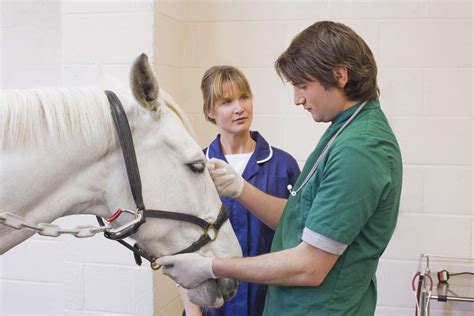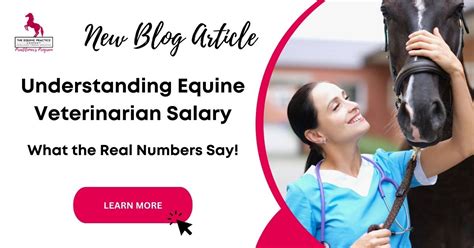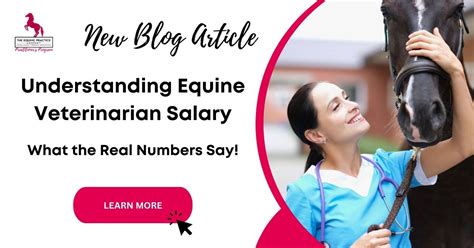For those who combine a deep passion for horses with a commitment to advanced medical science, a career as an equine veterinarian is a uniquely rewarding path. It’s a demanding profession, requiring resilience, expertise, and long hours, but it also offers significant professional and financial fulfillment. If you're considering this career, you're likely asking a critical question: What is the earning potential?
The answer is promising. While salaries can vary widely, the average equine veterinarian salary in the United States often exceeds $100,000 annually, with top specialists and practice owners earning substantially more. This article will break down the salary you can expect and the key factors that will influence your earnings throughout your career.
What Does an Equine Veterinarian Do?

An equine veterinarian is a medical professional who specializes in the health and well-being of horses, donkeys, and mules. Far more than just an "animal doctor," their responsibilities are vast and varied. On any given day, an equine vet might be:
- Performing routine wellness exams: This includes vaccinations, dental floating (filing teeth), and parasite control.
- Diagnosing and treating lameness: A significant part of equine practice, this involves complex diagnostics like nerve blocks, X-rays, and ultrasounds.
- Responding to emergencies: This can range from treating colic (a severe abdominal pain) and traumatic injuries to assisting with difficult births.
- Managing reproduction: Providing services like artificial insemination, pregnancy checks, and neonatal care for newborn foals.
- Conducting pre-purchase exams: Performing a thorough health assessment of a horse before it is sold.
- Performing surgery: From minor field surgeries to complex orthopedic or soft-tissue procedures in a hospital setting.
- Educating owners: Advising on nutrition, stable management, and preventative care is a crucial part of the job.
Average Equine Veterinarian Salary

To understand the earning potential, it's helpful to look at data for veterinarians as a whole and then narrow it down to the equine specialty.
According to the U.S. Bureau of Labor Statistics (BLS), the median annual wage for all veterinarians was $103,260 as of May 2022. The lowest 10 percent earned less than $65,510, while the top 10 percent earned more than $174,680. This provides a strong benchmark for the profession.
Data specific to equine veterinarians shows a similar and often slightly higher range, reflecting the specialized nature of the work.
- Salary.com reports that the average equine veterinarian salary in the United States is approximately $115,400, with a typical range falling between $91,200 and $145,100 (as of late 2023).
- Payscale notes a base salary range from $62,000 to $134,000, with an average around $87,500, highlighting the broad spectrum from new graduates to experienced practitioners.
A typical career salary progression might look like this:
- Entry-Level (0-2 years): $75,000 - $90,000
- Mid-Career (3-9 years): $95,000 - $125,000
- Experienced / Senior (10+ years): $125,000 - $150,000+
- Practice Owners & Board-Certified Specialists: $160,000 - $250,000+
Key Factors That Influence Salary

Your specific salary as an equine veterinarian isn't set in stone. Several key factors will significantly impact your earning potential.
###
Level of Education
All practicing veterinarians must hold a Doctor of Veterinary Medicine (DVM or VMD) degree. However, pursuing education beyond the DVM is the single most effective way to increase your earning power. After graduation, veterinarians can complete a one-year internship followed by a three-to-four-year residency in a specific field to become board-certified specialists.
These specialists, recognized as Diplomates of an AVMA-recognized specialty organization (like the American College of Veterinary Surgeons or the American College of Veterinary Internal Medicine), are the highest earners in the field. Their advanced expertise in areas like surgery, sports medicine, or internal medicine is in high demand and commands a premium salary.
###
Years of Experience
As with any profession, experience is a primary driver of salary growth.
- New Graduates: Veterinarians fresh out of school or in their first couple of years of practice (often in an internship) are at the lower end of the salary scale as they build their skills and speed.
- Associate Veterinarians: With a few years of experience, associates become more efficient, build a client base, and can handle more complex cases, leading to steady salary increases. Many practices offer production-based bonuses, rewarding vets who generate more revenue.
- Senior Veterinarians & Practice Owners: With a decade or more of experience, these professionals have the highest earning potential. Senior vets are often mentors and leaders within a practice. Those who become partners or own their practice shift from being employees to business owners, with their income tied directly to the profitability of the clinic.
###
Geographic Location
Where you choose to practice has a major impact on your salary. This is driven by both cost of living and the concentration of the equine industry. States with robust horse racing, showing, or breeding industries typically have higher demand for equine vets and thus offer higher pay.
According to the BLS, some of the top-paying states for veterinarians in general include Maryland, New Jersey, New York, and California. For equine practice specifically, high-demand areas include:
- Kentucky: The heart of the Thoroughbred breeding and racing industry.
- Florida: A major center for winter horse shows and racing.
- California & Texas: Large states with diverse and thriving horse populations across multiple disciplines.
- The Northeast (e.g., New York, Pennsylvania): Strong sport horse and racing communities.
Practicing in a metropolitan or affluent suburban area will generally yield a higher salary than practicing in a remote, rural location.
###
Company Type
The type of practice or organization you work for directly influences your compensation structure.
- Private Ambulatory Practice: Many equine vets work out of a truck, traveling to farms. Compensation is typically a salary plus production bonuses.
- Equine Hospital / Referral Center: These larger facilities often employ specialists and offer 24/7 emergency care. Salaries here can be higher, especially for specialists, reflecting the advanced level of care provided.
- Academia: Working for a university veterinary school may offer a lower base salary compared to top private practice jobs, but it is often offset by excellent benefits, research opportunities, and a better work-life balance.
- Industry: Veterinarians can also work for pharmaceutical, feed, or insurance companies in roles related to research, sales, or technical support. These corporate positions can be very lucrative and often come with a more traditional 9-to-5 schedule.
###
Area of Specialization
Within equine medicine, certain specialties are in higher demand and are more lucrative. While a general equine practitioner can have a very successful career, those who specialize in the following areas often reach the highest income brackets:
- Surgery: Board-certified equine surgeons, especially those specializing in orthopedics (bone and joint surgery) or colic surgery, are among the top earners.
- Sports Medicine and Lameness: This specialty focuses on keeping elite equine athletes at peak performance and is highly valued in the competitive horse world.
- Internal Medicine: Specialists in internal medicine handle complex cases involving cardiology, neurology, and neonatal intensive care.
Job Outlook

The future for veterinarians is bright. The BLS projects that employment for veterinarians will grow by 19 percent from 2022 to 2032, which is significantly faster than the average for all occupations.
This exceptional growth is fueled by a few key trends. The strong human-animal bond leads owners to invest more in their animals' health, including companion and performance horses. Furthermore, ongoing advancements in veterinary medicine mean there are more treatments and diagnostic options available, increasing the demand for highly skilled veterinary professionals.
Conclusion

A career as an equine veterinarian is a challenging yet deeply fulfilling pursuit. While it requires a significant investment in education and a willingness to work hard, the financial rewards are substantial and secure. The average salary provides a comfortable living, with a clear path to earning well over six figures.
For those considering this path, the key takeaways are clear: earning potential is directly tied to your ambition. By pursuing specialization, gaining valuable experience, choosing a strategic location, and potentially moving into practice ownership, you can build an incredibly prosperous career. For those dedicated to the health and well-being of horses, the path of an equine veterinarian offers not only a profound sense of purpose but also a financially stable and rewarding future.
